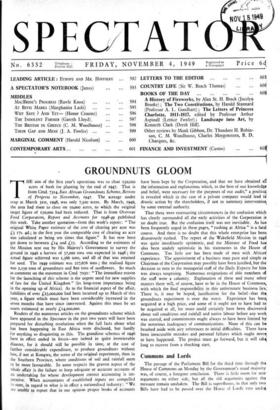Commons and Lords
The passage of the Parliament Bill for the third time through the House of Commons on Monday by the Government's usual majority was, of course, a foregone conclusion. There is little room for new arguments on either side, but all the old arguments against the measure remain unshaken. The Bill is superfluous, in that only two Bills have had to be passed over the House of Lords veto uncle. the existing Parliament Act since the measure became law in 191 It is true that the Lords have amended—and thereby greatly improved —the Iron and Steel Nationalisation Bill, and Mr. Morrison has so far modified his surprising statement that the decision to shorten the suspensory period had no connection with the Iron and Steel Bill as to say that the Parliament Bill was brought in " not for the sole and specific purpose of protecting any particular item of legislation in the Government's programme." We must be content, therefore, to regard the synchronisation of the two measures as one of the most remarkable coincidences in political history. The essential vice of the Bill is that it is retroactive in effect, applying not merely to measures to be passed by the House of Commons in the future, but to those (like the Steel Bill) which have already been passed once and would, but for the new measure, have to be passed twice more before they could be presented for the Royal Assent. Such retroactive arrangements are repugnant to the constitution and represent a further usurpation of power by the Government of the day. But what Is more to be regretted than anything else is that the Bill should have had to be introduced at all. The consultations between party Houselast year resulted in an agreement on the constitution of the House of Lords which, if implemented, would have given this country the best Second Chamber in existence. All that separated the two sides at the end was that the Conservatives demanded a delay of twelve months from the date of the Second Reading of the Bill in the House of Commons, while the Government was only prepared to concede nine months. Neither side would give way. Whichever had, the result would have been far better than under the present Bill, which leaves the constitution of the Upper House unaltered.



































 Previous page
Previous page